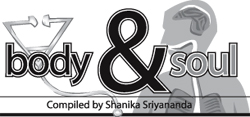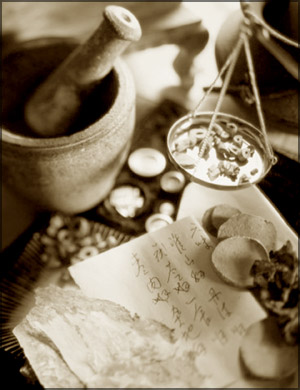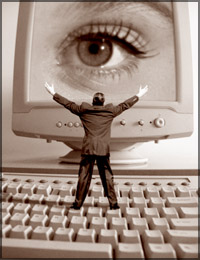
Homeopathic medicine and its therapeutic values
By Dr. Sandamali Wanninayake, Govt. Homeopathic
Hospital, Walisara.
Homeopathy is an effective and scientific system of healing which
assists the natural tendency of the body to heal itself. It recognises
that all symptoms of ill health are expressions of disharmony within the
whole person and that it is the patient who needs treatment not the
disease.
As a new patient, these ideas may be new to you, but homeopathy has
been established for about 200 years.
In 1796 a German doctor, namely Dr. Samuel Hahnemann, who was a
allopathic doctor discovered a different approach to the cure of the
sick which he called homeopathy (from the Greek words meaning ‘similar
suffering’).

Like Hippocrates two thousand years earlier he realised that there
were two ways of treating ill health, the way of opposites and the way
of similars.
Dr. Hahnemann’s hobby was to translate books from other languages to
German. While translating Cullen’s Materia medica, which was the
standard book on medical practice of that time, he came across a
footnote under Cinchona (Cortex Peruvianus) or the Peruvian bark that
its curative property in Malaria was due to the astringent qualities.
Hahnemann was not convinced with this explanation because there were
more astringent substances used in medicine, but not useful to cure
Malaria.
Dr. Hahnemann experimented on himself in 1790, by taking four drams
of a potion of Peruvian bark twice daily for a week. He experienced
symptoms similar to that of malarial fever.
This observation and reconfirmation of the same on other individuals
made him to record that “Peruvian (Cinchona) bark, which is used as a
remedy for intermittent fever, acts because it can produce symptoms
similar to those of intermittent fever, in healthy people.”
This made him to formulate that main principle that underlie the
teaching and practice of Homeopathy - “Let like be treated by the like”
(Simillia Similibus Curanture). This idea can be traced back to ancient
medical literatures also. By extensive and detailed proving with many
substances, Hahnemann systematized the Law of Similar that a substance,
which can produce symptoms in healthy person, can cure similar
combination of symptoms in natural sicknesses.
He called the experimentation of a medicine on healthy human being as
drug proving which is now known as Human Pathogentitic Trials.
While experimenting, he also discovered that remedies prepared by
series of dilutions and succession (vigorous shakings) reduces the toxic
effects of the original substances and at times even certain inert
substances could also produce curative properties due to activation of
its hidden dynamic powers. Thus he established the second principle of
Homeopathy, The theory of dynamisation.
The other important principles are:
(1) Minimum dose which advocates to use the least necessary dosage
just necessary to initiate a primary action on the vital economy of the
individual
(2) Depending up on the mode of onset and prognosis, natural diseases
are classified into Acute disease and Chronic disease. In homeopathy
acute diseases are those which have a sudden onset, sudden progress and
sudden decline either with the death of the patient or complete recovery
if not treated homeopathically.
The chronic diseases are those which has a insidious onset, slow
progress and ends with an irreversible state of health if not treated
properly
(3) General views on drug action: Primary action is the action of the
medicine on the person (Medicinal action) and secondary action is the
reaction of the body to the primary action which is the curative action.
Health is defined as absolute physical, mental and spiritual well-being
and diseases are the deviation at any level of health.
The effects of the medicine on the human system are assessed through
twelve observations, which direct the physician to adjust the dose,
modify the prescription etc.
Homeopathy is a science of natural medicine used to stimulate the
person’s vital force (immunity) to heal itself. Homeopathy medicines are
formulated from natural resources of animal, vegetable or mineral
origin. (Plant kingdom, animal kingdom, mineral kingdom, nosodes,
sarcodes, impoderabelia) Homeopathy medicine made from herbs and
precisely manufactured in potent qualities according to strict standards
and procedures prescribed in the homeopathic pharmacopoeias.
They are safe devoid of any adverse side effects, cost effective,
build resistance to infection. It uses simple medicines repaired from
natural resources. About 75% of the medicines are repaired from plant.
Homeopathy plays a vital role in maintaining and improving the state
of health of human kind. Homeopathy corrects various obstetrical and
gynaecological problems. Homeopathy medicine act very well effectively
in the common ailments of children from infancy to teenage.
The main cause of scientific skepticism surrounding homeopathy is its
use of very high dilution, including ‘ultra molecular dilutions’ that
are diluted beyond the point (10-M) at which any molecule of the
starting substance is likely to be present.
Plainly ultra-molecular dilution cannot have any classical
pharmacological effects, their potential site or site of action in a
number of laboratories. It should in practice lie in the same range of
concentrations as those used in conventional medicine (10 to 10 M).
Homeopathy is great comfort for treating many common ailments. With
some basic remedies of homeopathy, it is possible to cost effectively
with many of the common ailments and first aid situation one encounters.
(Fever, catarrh, pains, diarrhoea etc.)
Homeopathy can be used for almost all ailments with a few exceptions
such as cases of severe physical injury for speed-up healing. Homeopathy
has shown effective and prove results for respiratory diseases, skin
diseases, nervous problems, gynaecological complications, gastritis,
anaemic conditions, etc.
Surgery is thus avoided in homeopathy in condition like prolepses of
uterus, piles, warts, corns etc.
Singles ‘face Alzheimer’s risk’
Being single when you reach middle age could mean more than having
the house to yourself - it could increase your risk of dementia. Swedish
research, presented at a US conference, found that marriage or having a
partner halved the risk of developing dementia. Scientists believe
social interaction between couples may ward off illness.
 The
Alzheimer’s Research Trust said the results were worrying, given the
high divorce rates in the UK. These findings are particularly worrying
for the UK - a society with a high divorce rate, marriage at an all-time
low, and ageing population Rebecca Wood, Alzheimer’s Research Trust The
Alzheimer’s Research Trust said the results were worrying, given the
high divorce rates in the UK. These findings are particularly worrying
for the UK - a society with a high divorce rate, marriage at an all-time
low, and ageing population Rebecca Wood, Alzheimer’s Research Trust
The study by the Karolinska Institute suggested that the problem
might be even greater for some people.
Divorcees who remained single, they noticed, had a trebled risk of
dementia, while those widowed at a young age who stayed single faced a
six times greater chance.The research looked at 1,449 people from a
Finnish database, who were asked about their relationship status in
mid-life, then revisited 21 years later to see if they had developed
dementia.
In total, 139 of them had some sort of cognitive impairment, and
Alzheimer’s had been diagnosed in 48 of these.
Even after other factors which might have an impact on dementia were
adjusted for, the study consistently showed people with partners as less
prone to the illness.
Dr Krister Hakansson, who led the study, said: “Living in a couple
relationship is normally one of the most intense forms of social and
intellectual stimulation.
“If social and cognitive challenges can protect against dementia, so
should living as a couple.
Singletons shouldn’t worry - there are many other ways to reduce your
risk of dementia that don’t involve popping the question Susanne
Sorenson, Alzheimer’s Society
“This study points to the beneficial effects of a married life.”
Rebecca Wood, from the Alzheimer’s Research Trust, said that more
research along these lines was urgently needed.
“These findings are particularly worrying for the UK - a society with
a high divorce rate, marriage at an all-time low, and ageing population.
“This is the first study of its kind to examine the link between
midlife marital status and dementia, adding to previous research
suggesting that social interaction reduces dementia risk.”
However, Susanne Sorenson, from the Alzheimer’s Society, had some
words of cheer for partnerless people.She said: “Singletons shouldn’t
worry - there are many other ways to reduce your risk of dementia that
don’t involve popping the question.
“The best evidence is around eating a Mediterranean diet, exercising
regularly and not smoking.”
She also said that the findings were consistent with other research
showing social interaction could be beneficial.
She added: “Whether it’s reaching for the vacuum cleaner or going for
long romantic walks, lifestyle factors associated with being married may
also help.”
-BBC.com
Eyecare when using a computer
 If
you spend most of your weekday sitting in front of a video display
terminal, you’ve probably noticed that using a computer can be a pain in
the neck, the eyes and almost every other part of your body! If
you spend most of your weekday sitting in front of a video display
terminal, you’ve probably noticed that using a computer can be a pain in
the neck, the eyes and almost every other part of your body!
It’s no wonder computers cause eye strain. Studies have shown that
computer users tend to stare at a glowing screen without blinking for
much longer periods than do people who use typewriters. This is why many
people using computers experience dry eye problems.
In addition, computer screens reflect a great deal of glare - from
windows, overhead lights and even the user’s own bright clothing.
Finally, many computer users sit practically face-to-face with the
monitor.
Whether you spend every day or only a few hours a week using a
computer, there are steps you can (and should) take to reduce the
physical strains from computer use.
Steps to follow, when using a computer:
* Have a thorough eye examination. While everyone should have their
eyes checked once a year, annual eye exams are especially important for
computer users.
* Follow the “20/20 rule.” Keep your face at least 20 inches from the
screen and pause every 20 minutes or so to look around the room, so your
eyes can focus on distant objects. Regular eye exercise helps prevent
eye strain.
* Place all materials you are working with at the same distance as
the screen. This reduces strain of your eyes and neck.
* Make sure you have a glare screen, which should block glare without
making the characters on the monitor appear fuzzy. Also if possible,
move or adjust the computer screen to avoid reflections from windows or
indoor lights.
* Sit on a stable, comfortable, adjustable chair. If it is possible
to put the keyboard a few inches below the desktop, for example, with an
adjustable table, or by using a center drawer of a desk for a pullout
keyboard rest, do so. This will keep your arms at a more comfortable
angle.
* Place computer monitor at a 35-degree angle below your eyes. This
reduces incidence of Dry Eye.
* Use preservative-free artificial tears intermittently when on the
computer if your eyes get red and irritated. Much of computer fatigue is
caused by Dry Eye.
* Finally, take periodic breaks from the computer during the day,
walk around and do some non-computer tasks for about 15 minutes every
two or three hours.
Sore throat ...
 A
sore throat can really get you down, so here are a few things you can
use to take away the suffering. A
sore throat can really get you down, so here are a few things you can
use to take away the suffering.
Vinegar can ease the pain. Any type will do but wine vinegar or cider
vinegar may taste better. Put a teaspoon of vinegar in a glass of water.
Gargle, then swallow. Do this 3 times a day until things are on the
mend.
Put some warm water in a glass and mix with some salt. Put in your
mouth and gargle and spit out. Don’t swallow. This should get rid of the
soreness.
Take a few almonds and mix them with a couple of teaspoons of honey.
Sit down and eat away. This will give the pain of a sore throat nothing
to moan about. Honey is a natural pain killer, so are almonds. The
almonds will also help to relieve the inflammation.
Hope that one of these ideas will bring you some relief.
onlinebangalore.com |
